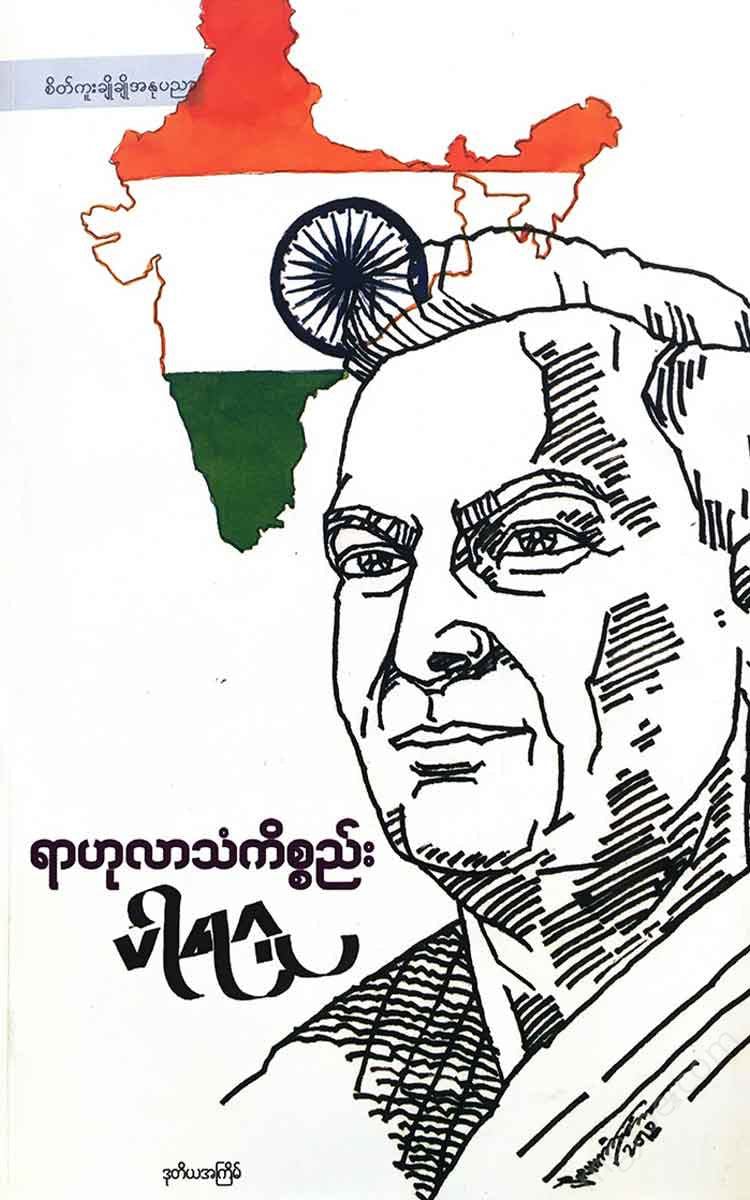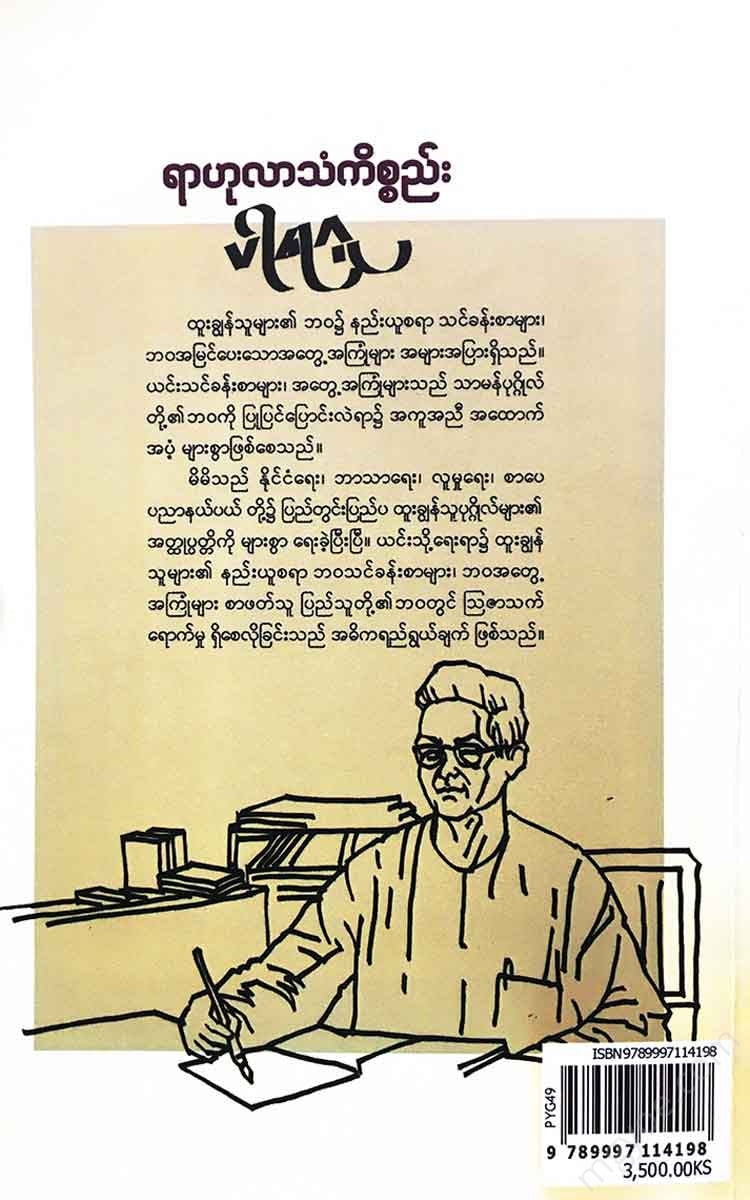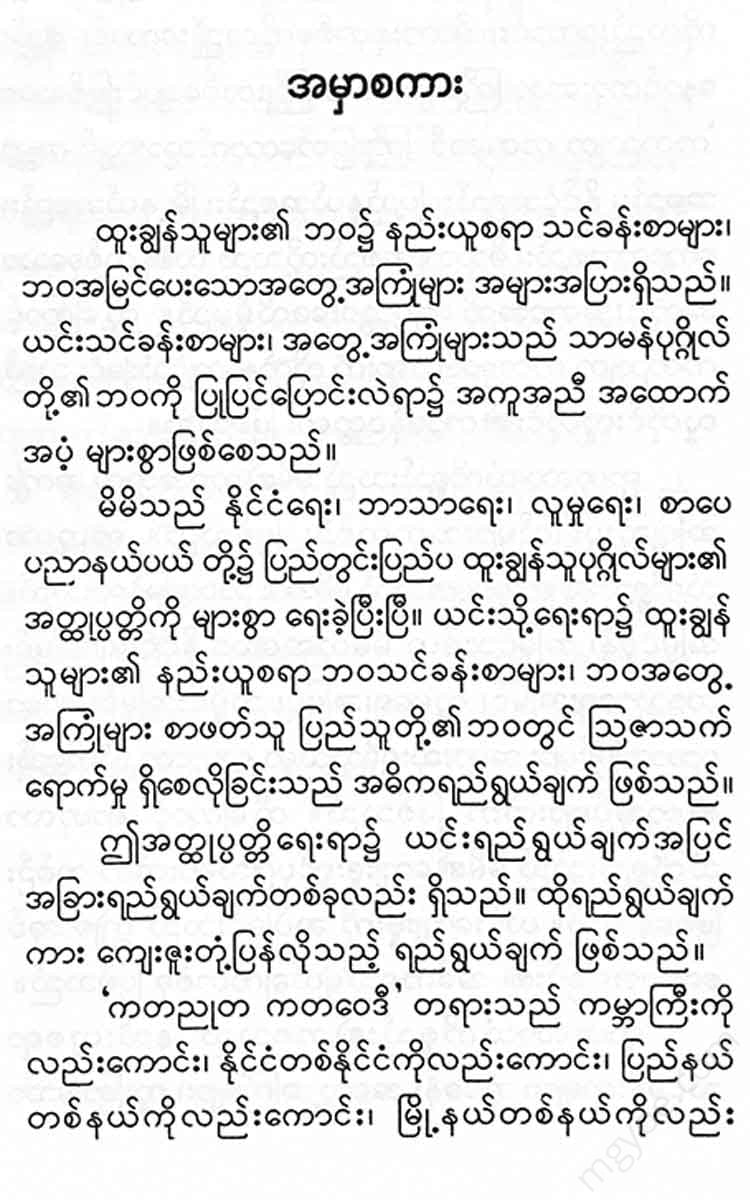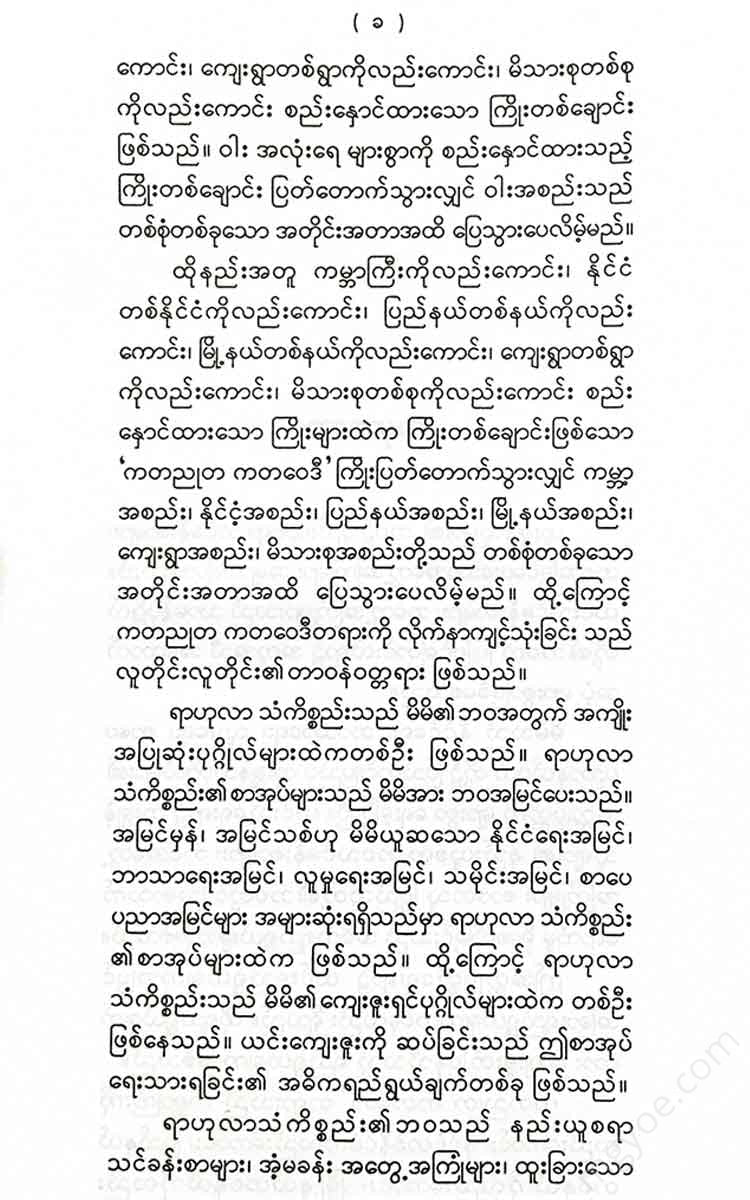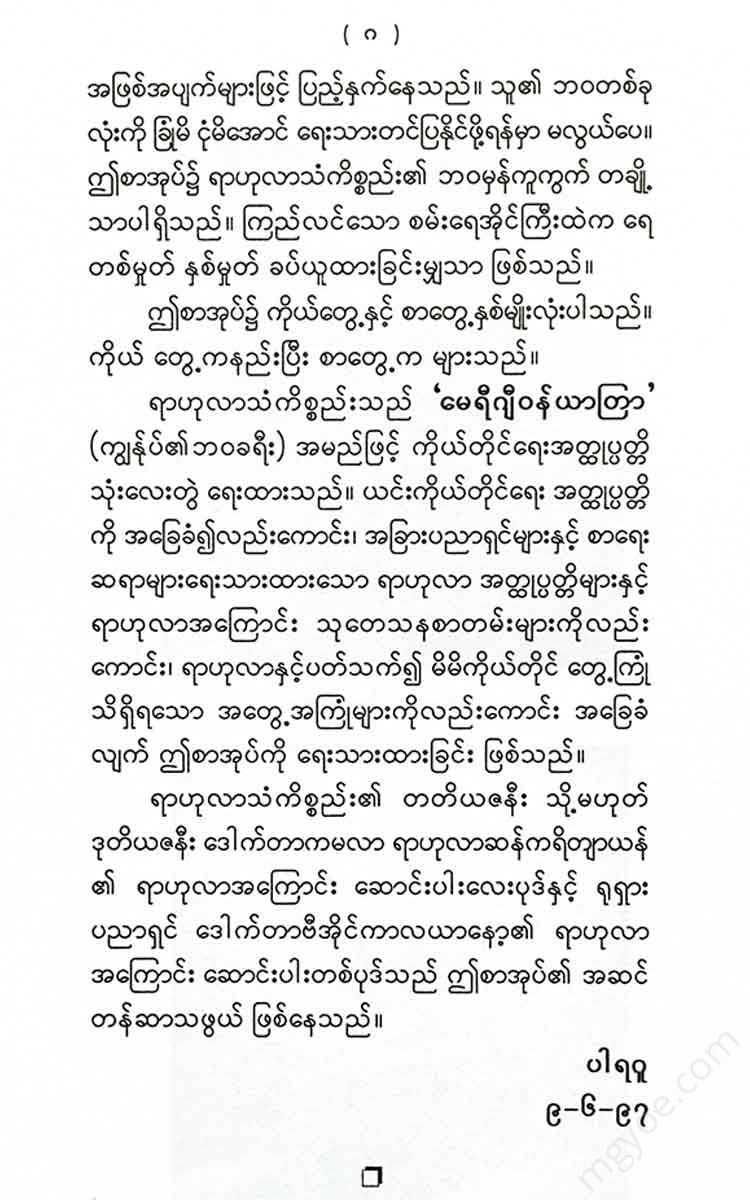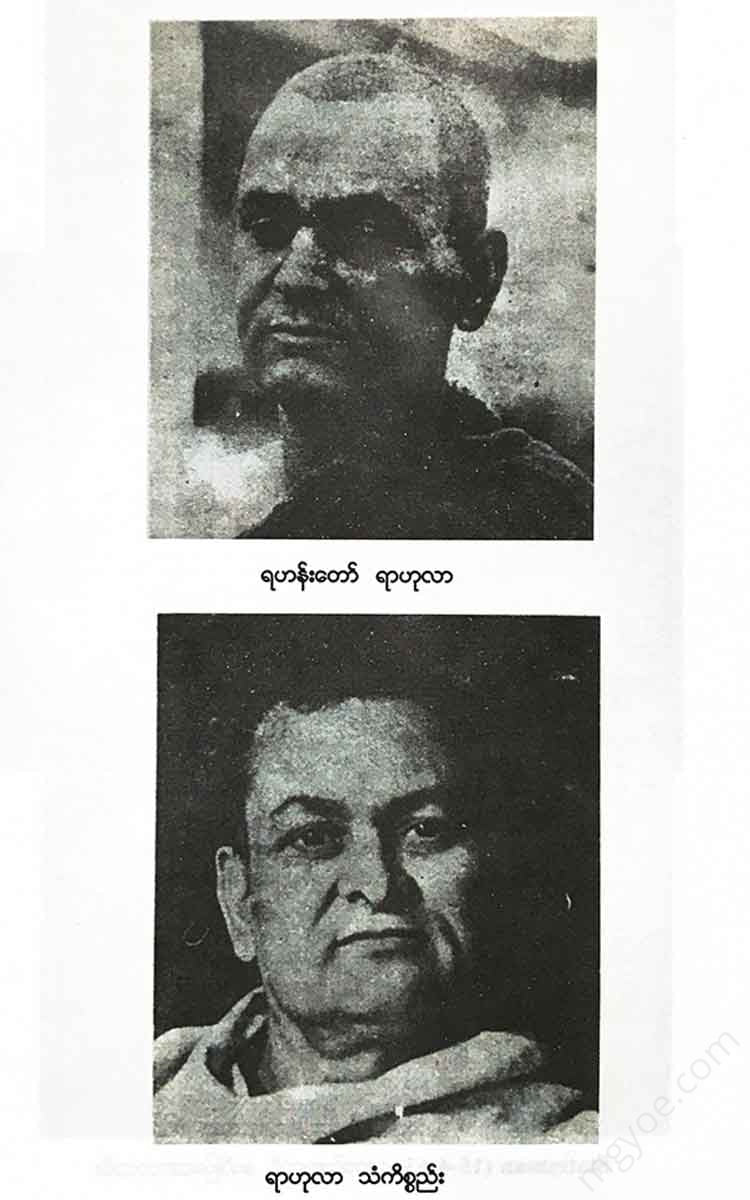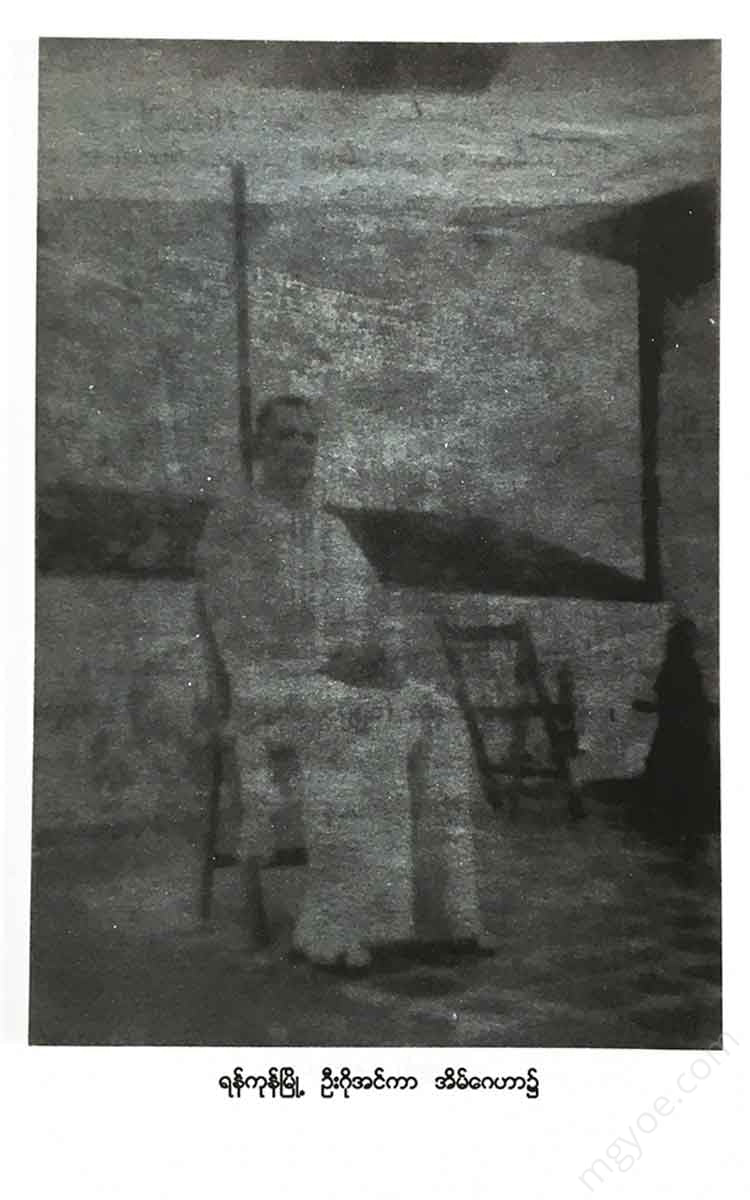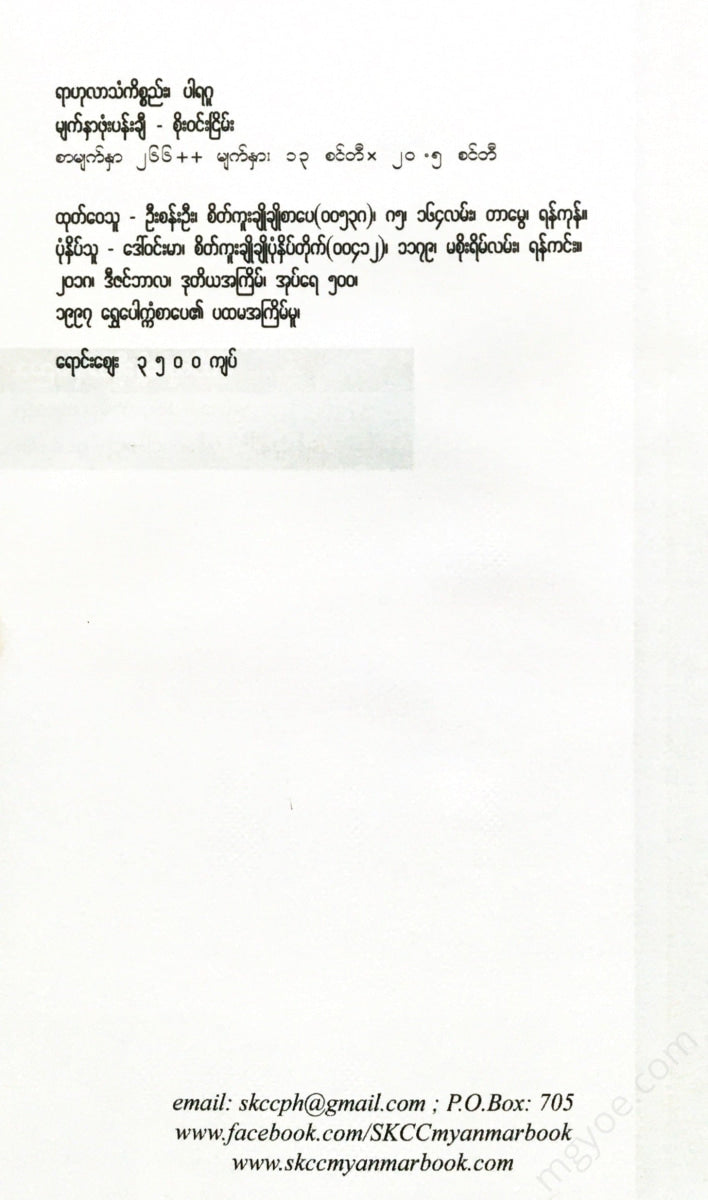စိတ်ကူးချိုချိုစာပေ
Paragu - Rahula's story
Paragu - Rahula's story
Couldn't load pickup availability
The Rahula incident
Rahula Sankrit was born on April 9, 1893, in Pandharsha, Uttar Pradesh, India. His childhood name was Kedarnath Pandya. He studied at a middle school in a nearby village. Once, he ran away from home in fear when a milk jug he was storing overturned. He worked for days in Calcutta, reading posters and signs, and learned Bengali. He taught Sanskrit and Arabic in Varanasi, Agra, and Lahore. He became a monk of the Prasad Hindu monastery under the name Ramodar Rasabu.
In 1921, he took active part in the Indian freedom struggle. He spent two years as a prisoner in the Bhadkasa and Hajari Bhadka prisons. Then in 1927, he went to Sri Lanka to study Buddhist literature. He taught Sanskrit literature at the Vijjalankara College in Sri Lanka and studied the Pitaka scriptures, earning the title of Tipitaka Sriya. Then in 1929-30, he went to Tibet for the first time (later three times) to search for ancient Buddhist scriptures that had disappeared in India, and brought back to India many manuscripts, photographs, and copies of Buddhist scriptures that were extremely difficult to obtain. These scriptures are preserved in the Patna Museum and the Kashi Prasad Jayaswal Research Institute in Patna.
Became a party member
After returning from Tibet, he became a Buddhist monk with the name Rahula Sankritayayana. In 1932-33, he preached in England and other European countries. In 1935-36, he visited Japan, Korea, Iran, and Soviet Russia. In 1937, he again visited Soviet Russia. Then, after changing his clothes, he participated in the Amaravati Peasant Uprising in 1939 and was imprisoned. He embraced Marxism and became a member of the Communist Party of India.
After teaching literature at the Oriental Department of the Leningrad Academy of Sciences in 1945, he returned to India after India gained independence. In 1947, he was elected president of the Bombay conference of the Hindi Bahu Samman (Hindi Literature Association).
In 1958, he went to China via Burma. After returning from China, he worked as a professor of philosophy at the University of Witsalanka in Sri Lanka. In 1961, he suffered from amnesia. He died in India in December 1963.
Rahula was awarded the "Sahitya Sakvahi" (literary degree) from the Vijjalankara University and the Delhi University from Bhagalpur University. He received the Sahitya Akademi Award for his book "A History of Central Asia". He was awarded the "Bharat Bhushan", the highest civilian award awarded by the Government of India.
However, among the titles awarded to Rahula, the title of “Maha Pandita” conferred by the Varanasi Council of Scholars is the one that best suits Rahula. He is the only one to have received this title. After receiving this title, Rahula was called “Maha Pandita Rahula Sankrita Yayana”.
Centenary
This year, 1993, marks the centenary of Rahula's death. Rahula's centenary celebrations are being held all over India this year. Among these celebrations, the one organized by the Delhi Government's Hindi Academy is unique. It was held for three days on February 1 and 2, 1993, in New Delhi. In the Rahula Centenary Celebrations, which were of national interest, many literary scholars read out their studies on Rahula. They delivered speeches. A large number of literary enthusiasts also attended.
On the first day of the festival, after the opening ceremony, a seminar was held on the theme “The Journey of a Great Traveler”. In the seminar, a paper was read by Shri Vishnu Chandra Brahma and two other literary scholars discussed. The famous poet Shri Trilok Namasatrya acted as the chairman. On the second day, the seminar was chaired by the famous novelist Shri Bhisma Sahani and three other literary scholars discussed. The theme of the seminar was “History and Fiction”. The theme of the third seminar was “Don’t Run Away and Change the World”, named after a book written by Rahula. Dr. Mahadev Saha, a friend of Rahula, acted as the chairman of the seminar. Tripathi read the paper to Dr. Veena and two other literary scholars discussed it.
At the inauguration ceremony of the centenary of the faith, Dr. Harbhajan Singh said that Rahula was considered a man endowed with the talent given by Issara because he did not accept Issara. It is not easy to express his views on Rahula. Rahula's literature is not only extensive but also diverse. It is not easy to give a unanimous opinion about his literary works and his personal characteristics. The germ of his talent came from this society. Rahula was a child of poverty and faced the problem of unemployment. It seems that his heart always needed fulfillment. Rahula seemed to be moving from the imperfection of life to the perfection, taking steps to fill the missing. He came from Vaishnava (Vishnu worshippers) to Arya Samaj and then to Buddhism. Then he said that he became a communist again, that there was no religion in Rahula's life, that emancipation was something that was born of the human mind, that in his life only renunciation and detachment were found, which were rare in ordinary people, that Rahula was free from all narrow-mindedness, and that if we study the lives of great writers like Rahula, we will see that those who do great work are given great value in their present lives... etc.
Then, the Delhi Chief Minister Shri P.K.B. said that it is hard to believe how great and extensive the work that Rahula did, that in a single lifetime he left us with precious treasures drawn from every corner of knowledge, that it is not easy to compile all the literature that he compiled, and that it would be a very important task to compile all of Rahula's literature in the centenary year, and then he suggested that the Hindi Academy conduct research on Rahula's literature.
the truth
In the second part of the seminar, the presenter, Shri Vishnu Chandravarma, presented in his paper the remarkable events and noteworthy facts that happened to Rahula from the time of his birth as a child, Kedarnath Pandit (Rahula Samsam), on April 9, 1893, to his death on April 14, 1963.
The text states that from the age of four to 12, Rahula worked as a weaver between his father's farm in Shahanagar and his grandfather's village in Pandaha, about 10 miles away. Varanasi was Rahula's first base for education. Rahula gradually became a Pandit. As he traveled the world, Rahula became a Tibetan historian, linguist, sociologist, and antiquarian.
Rahula's life story is the story of a true pragmatist. Rahula was a creator of scientific truths in historical archaeology, science, philosophy, culture, language, and literature. Rahula emphasized his own personal experiences in various fields. Regarding his experimental record, Rahula wrote, "What a scientist discovers in a laboratory is called scientific truth only when other scientists also discover it in their laboratories." Rahula's autobiography and books are the burgeoning scientific truth of India.
Left behind
Discussing the paper, Shri Trilokjan Shastri said that the study of Rahula's writings was necessary for the progress of a new India and criticized, "During Rahula's time and after his death, a class of intellectuals who were cowardly, self-important, narrow-minded and self-centered had increased in the country. These individuals fled the changing India and remained cut off from the mainstream of the people."
Dr. Namavara Saini, a panelist on the second part of the seminar, “History and Writing”, said, “The special feature of Rahula’s positive thinking is the wide spread of his ideas. His “From the Volga to the Ganges” summarizes a history that is seven thousand years long. The connection of India with the world order is the breadth of Rahula’s thinking. Rahula’s innate intelligence is unparalleled. Rahula did not follow anyone. It was the common people who made history. Rajas and Maharajas did not make history.”
The third part of the seminar, titled “Don’t Run Away and Change the World”, was presented by Dr. Vindhanath, who in his paper pointed out Rahula’s efforts to change the world. Professor Nirmala Jain, who discussed the paper, said, “If Rahula were alive today, he would definitely rewrite his book. This is evident from the introduction that he writes every time the book is republished. When Rahula wrote the book, the Buddha’s Dhamma was still in his mind. While walking on the path of Buddhism, Rahula pointed out the hellish nature of the oppressed life, its causes, and the way to get rid of it.”
In the third part of the seminar, Rahula's slogan, "Don't run away, change the world," echoed throughout the ceremony.
Share
